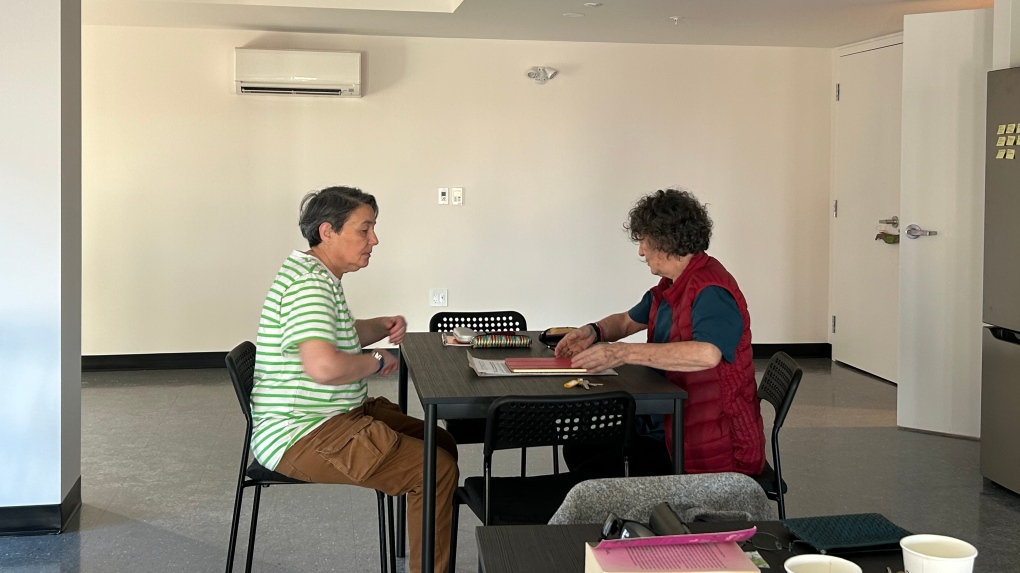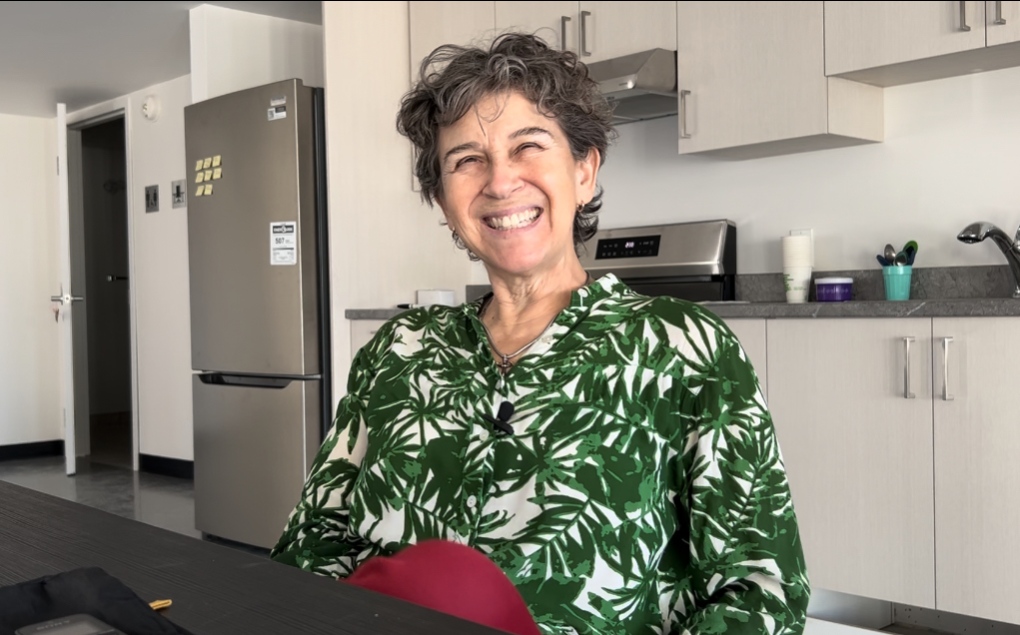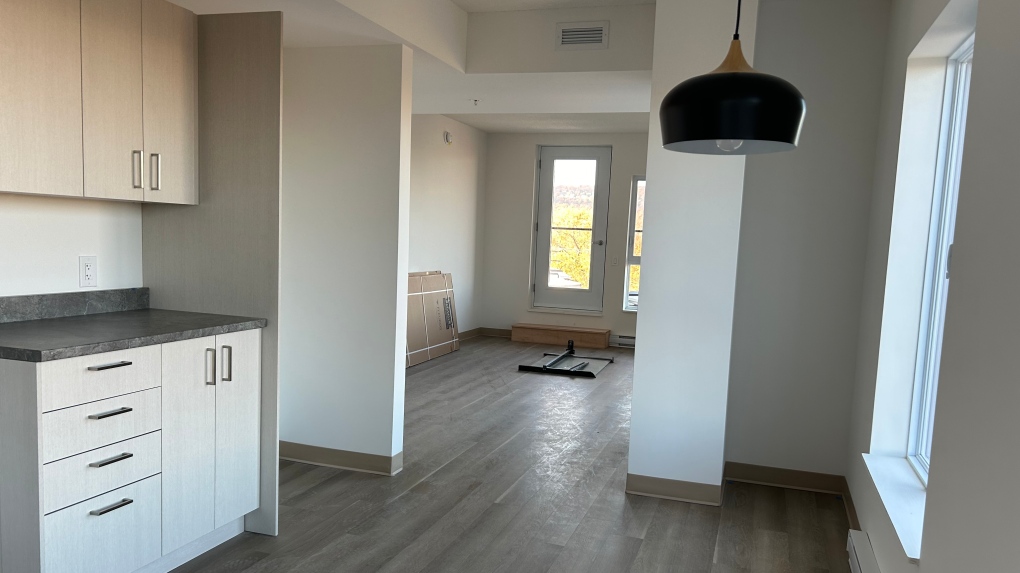Montreal's senior home for lesbians welcomed its first tenants
 Alexandra Henriques is one of Maison RebElles' first tenants and signed her lease Thursday. (Erika Morris / CTV News)
Alexandra Henriques is one of Maison RebElles' first tenants and signed her lease Thursday. (Erika Morris / CTV News)
It’s been almost a decade in the making — Montreal inaugurated its first home for lesbians 55 and over, and its tenants started moving in.
Alexandra Henriques signed her lease to join the Maison RebElles on Thursday, coming all the way from Quebec City. She’s occupying one of the 22 rooms available at the home in the St-Henri neighbourhood.
“The description, I already thought this is the kind of place I’m looking for and it’s perfect, just lesbians,” said Henriques.
Isabelle Duclaud, the treasurer for the Maison RebElles, has been working on the project since its inception.
“It’s an old dream for many of us,” she said.
A 2017 study by Egale showed that the fear of being pushed back into the closet was the number one issue for LGBTQ seniors.
Henriques knows the issue all too well. She spent years working in the seniors’ wing of an LGBTQ2S+ organization in Vancouver and noticed how poorly people were sometimes treated. She said that some never let go of their old prejudices.
 Alexandra Henriques (left) signed her lease with Maison RebElles treasurer Isabelle Duclaud (right) on Thursday. (Erika Morris / CTV News)
Alexandra Henriques (left) signed her lease with Maison RebElles treasurer Isabelle Duclaud (right) on Thursday. (Erika Morris / CTV News)
“I remember people saying to me, ‘My sister is in a residence and she’s a lesbian and people wouldn’t sit with her at lunch,’ and stupid things like this,” said Henriques.
“Those bullies and stupid people from high school are still there, in the residence, waiting for you to move in.”
That was Duclaud’s biggest motivation while working with the 10 or so other founding members of Maison RebElles.
“We’ve been oppressed and invisibilized in our youth and we didn’t want that in our old age. Most of us have been activists, we fought for our rights,” she said.
“There’s no way we’re going back to the closet at our age, and unfortunately that can happen when you move into seniors’ retirement homes.”
Voli Mamfredis, an architect and Duclaud’s spouse, pointed out that one of the leading causes of health decline among seniors is loneliness, and many LGBTQ2S+ people don’t have kids to take care of them.
 Voli Mamfredis is one of the founding members of RebElles, along with her spouse Isabelle Duclaud. (Erika Morris / CTV News)
Voli Mamfredis is one of the founding members of RebElles, along with her spouse Isabelle Duclaud. (Erika Morris / CTV News)
But the RebElles “have no intention of being lonely — in fact, it might have problems that there’s too many friends around,” said Mamfredis.
She stressed that the Maison RebElles isn’t a typical senior retirement home, but rather an intentional co-housing community. All founding members will be moving into the building, and the others were selected after thorough interviews to see if they were the right fit.
It’s a home for active lesbians aged 55 and up who don’t need long-term care and want to age at home.
“We’ve always been independent, and especially feminist women, lesbians that have always said, ‘No, no, we’re going to keep on living and we’re going to take care of each other,’” she said.
“So, yeah, it’s preparing that next chapter to make sure that we live fully.”
The units available vary from studios to four-and-a-halves and are fully functional apartments. There is also a large common space with a communal kitchen for people to have large dinners and hold social events, and for residents to play cards or do yoga together. Only one studio is still up for grabs.
'A success story'
When president of Bâtir Son Quartier, Edith Cyr, was approached by the RebElles asking them to be partners in their project, she said it was a no-brainer.
Their mission is to help people, especially those who are marginalized and have low incomes, she said, adding that a home for LGBTQ2S+ women seniors fit all their criteria.
With the help of BSQ, the RebElles secured funding and started looking for the right spot – the lengthiest part of the project. They finally landed on the St-Ambroise location, in a building they share with two other women’s groups, Logifem and Libr’elles.
“This is a success story for us,” said Cyr. “When we know that people are moving into their units and they’re happy, we’re fulfilled.”
“They have a sparkle in their eyes when they talk about their home … it’s a real community they’re building. And when you grow older, you want to be safe, you want a space to be yourself.”
 The units available vary from studios to four-and-a-halves and are fully functional apartments. (Erika Morris / CTV News)
The units available vary from studios to four-and-a-halves and are fully functional apartments. (Erika Morris / CTV News)
Though Duclaud said it took 10 years for the project to be fully realized, once the location was found it only took two years to develop.
“It just takes time to fully plan out your vision,” said Cyr, “but I don’t want people to think ‘Oh it takes too long to develop community housing,’ because then no one will want to do it.”
The 22 units are affordable and non-profit, and eight are eligible for subsidies from the Société d’habitation du Québec so tenants only pay 25 per cent of their income to stay.
The other tenants will be moving in over the next two months.
More spaces needed
Cyr believes the RebElles project, along with the Libr’elles and Logifem, will be a great model for future projects.
“We hope we can do more like this and that the governments continue to invest in them,” she said.
Duclaud and Mamfredis said they believe the RebElles home will stand for a long time and want others to feel inspired to have more spaces for LGBTQ2S+ seniors.
Henriques said it’s of “paramount importance” to have spaces dedicated to people like her. She said she's only aware of another LGBTQ2S+ home in Toronto and hopes to see some for gay men and trans people.
“People didn’t want to consider anything about LGBTQ seniors like we weren’t always there, like we weren’t there when you were in grade school, like we weren’t there when you were in high school — we were always there!” she said.
“This is what? The first one in Montreal, the first one in Quebec? It’s too little.”
CTVNews.ca Top Stories

Quebec fugitive killed in Mexican resort town, RCMP say
RCMP are confirming that a fugitive, Mathieu Belanger, wanted by Quebec provincial police has died in Mexico, in what local media are calling a murder.
Trump again calls to buy Greenland after eyeing Canada and the Panama Canal
First it was Canada, then the Panama Canal. Now, Donald Trump again wants Greenland. The president-elect is renewing unsuccessful calls he made during his first term for the U.S. to buy Greenland from Denmark, adding to the list of allied countries with which he's picking fights even before taking office.
Canada regulator sues Rogers for alleged misleading claims about data offering
Canada's antitrust regulator said on Monday it was suing Rogers Communications Inc, for allegedly misleading consumers about offering unlimited data under some phone plans.
Pioneering Métis human rights advocate Muriel Stanley Venne dies at 87
Muriel Stanley Venne, a trail-blazing Métis woman known for her Indigenous rights advocacy, has died at 87.
Multiple OnlyFans accounts featured suspected child sex abuse, investigator reports
An experienced child exploitation investigator told Reuters he reported 26 accounts on the popular adults-only website OnlyFans to authorities, saying they appeared to contain sexual content featuring underage teen girls.
King Charles ends royal warrants for Ben & Jerry's owner Unilever and Cadbury chocolatiers
King Charles III has ended royal warrants for Cadbury and Unilever, which owns brands including Marmite and Ben & Jerry’s, in a blow to the household names.
Man faces murder charges in death of woman who was lit on fire in New York City subway
A man is facing murder charges in New York City for allegedly setting a woman on fire inside a subway train and then watching her die after she was engulfed in flames, police said Monday.
'Serious safety issues': Edmonton building where security guard was killed evacuated
An apartment building where a security guard was killed earlier this month is being evacuated.
Santa Claus cleared for travel in Canadian airspace
Santa's sleigh has been cleared for travel in Canadian airspace, the federal government announced on Monday just ahead of the busy holiday season.
































